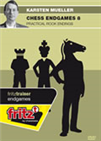Incredible late surge in come-from-behind win

Poland is ranked 10th in the world among nations considering it's top players. For comparison: Russia is first, followed by China and the USA. Germany is ranked 14th); The two best players going into the tournament, Radoslaw Wojtaszek (2750, No. 18 in the world rankings) and Jan-Krzysztof Duda (2724, No. 27 in the world rankings), naturally play a key role. And yet it was the defending champion Kasper Piorun who led the national championship for much of the way, despite his relatively modest 2633 Elo (putting him 138 in the world currently). But Piorun eventually faded, and after losing to Duda in the critical eighth round, the momentum shifted firmly to the 20-year-old, who is now neck and neck with Wojtaszek for the top Polish spot.
Duda had a slow start, and at the halfway mark it seemed almost impossible that he would be the Polish Champion by the end of the week. As he himself noted, beginning with four draws was not some sort of tournament strategy but rather the unexpected consequence of a relatively long tournament break. But he scored a remarkable 4½ points from his last five games, including a clutch win over the tournament leader in the penultimate round.
Like a fine wine, the Four Knights only improves with age, establishing itself as an extremely effective way of meeting 1...e5. On the outside this opening seems deceptively quiet, yet apparently natural moves can often lead to some devastating attacks.
Piorun tried a risky strategy in the last round against Aleksander Miśta with the black pieces, in an effort to catch up. He chose a slightly disreputable line in the Spanish game in a vain attempt to get a double-edged position, however, it turned out that he met a well-prepared opponent who kept a positional advantage en route to a smooth victory.
 Rook endings are amongst the most frequently encountered endgames there are, and so your training effort will be quickly repaid in the form of half and full points. Knowing even a few rules of thumb and key methods makes life a great deal easier and provides a guiding light even in complex positions. This DVD focuses on the important themes which are to be found in common rook endings.
Rook endings are amongst the most frequently encountered endgames there are, and so your training effort will be quickly repaid in the form of half and full points. Knowing even a few rules of thumb and key methods makes life a great deal easier and provides a guiding light even in complex positions. This DVD focuses on the important themes which are to be found in common rook endings.
Despite losing both of his last two games, Piorun remained in second place (5½ / 9). Third place went to Grandmaster Jacek Tomczak, the runner-up of the previous year, who ended with 5/9. Tomczak, who is also a successful correspondence chess player, explained his above-average performance (in 2017) by always taking the Polish championship very seriously, as he plays fewer tournaments than most other participants.
Not satisfied with his tournament performance was Radosław Wojtaszek, the Polish number one (now by just a fraction of an Elo point!). He could make up for his two losses against Duda and Miśta, 50 percent, is naturally a disappointment for him. It was not easy to come directly from the elite Gashimov Memorial tournament in Shamkir, Azerbaijan, and adjust to a scenario in which, as the rating favourite, a draw was not sufficient against most of the field.
Besides Wojtaszek, Miśta and tournament veteran Michał Krasenkow also came in at 4½ / 9. They have no reason to be dissatisfied with their results; this was the strongest ever Polish Individual Championship, a fact that didn't go unnoticed by chess fans around the world.
Neither of Poland's top two competed in 2017, and all rounds were covered (in Polish) by a robust video webcast production rivalling other prominent contemporary tournaments.
Final standings
All games
WGM Keti Tsatsalashvili was among the spectators and posted this vlog about her visit:
Direct from Warsaw | tsatsalashvili.keti on Facebook
Budimex Women's Championship
Jolanta Zawadzka won a two-game rapid tiebreak match against 25-year-old Anna Warakomska (WIM, Elo 2295). Both players came in 6½ / 9. The match was played immediately after the end of the 9th round and in fact, Warakomska had draw odds, since a 1-1 tie would give her the title on account of mathematical tiebreaks.
It's an innovative format which aims to solve several problems. Fans want to see a top title decided over the board but organisers would certainly prefer to resolve the tournament on the day of the scheduled final round. Logistically, financially and dramatically, it's an advantage to avoid a separate "playoff day". Both rapid games thereby have tension and clear stakes, while blitz is avoided, which though exciting tends to somewhat taint the outcome as unserious.

Anna Warakomska is the sister of GM Tomasz Warakomski | Photo: Walusza Fotografia
For Jolanta Zawadzka it is the fourth national championship title. She played very solidly and was the only undefeated participant.
Zawadzka was one of the favourites right from the start and was in the pack of the players chasing tournament surprise Warakomska, who showed very mature chess and had taken the sole lead. She was overtaken only after a defeat against Iweta Rajlich.
Bronze went to 17-time national champion Monika Soćko, who drew a bad position in the last round against Marta Bartel, the wife of Grandmaster Mateusz Bartel, to squeek through to the podium.

Anna Warakomska, edged out by Jolanta Zawadzka, with Socko third | Photo: Piotr Jedrzejewski, mp2018.pzszach.pl
Final standings
All games
Translation from German: Macauley Peterson
Links
























